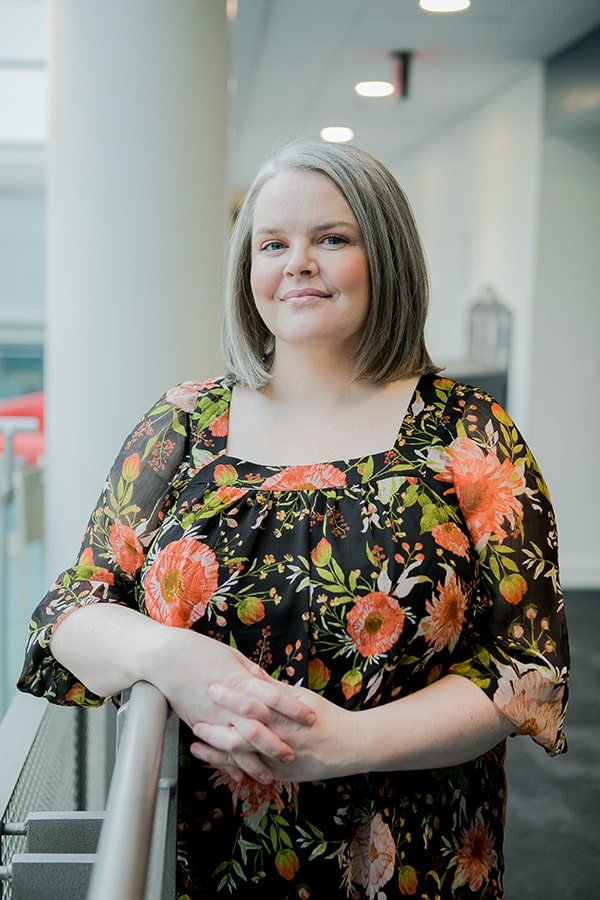Faculty Spotlight: Katharine Burns
By Stacy Kish
Katharine Burns, assistant professor of second language acquisition and Hispanic studies, takes an interdisciplinary approach to applied sociolinguistics. Her research explores language ideologies, language policy & planning, heritage language learning and much more. She mentors graduate students and teaches several graduate and undergraduate courses in the Department of Modern Languages.
Tell me about your scholarly work.
I study applied linguistics. The applied part is where I take theoretical concepts from linguistics and work on real-world issues through language. I am focused on second language acquisition, as well as how language is used, learned and taught. There are three areas of my research: 1) how Spanish in the U.S. is spoken and taught; 2) bilingual and multilingual identities and 3) language policy and planning.
How is your scholarly work adding to the greater field?
My work takes a critical lens to understand the power dynamics and power imbalances in how language is taught. A lot of my work also deals with language ideology, which is the set of beliefs that societies and individuals have about languages. Languages are naturally diverse. Every language has multiple varieties, some of which are marginalized based on different social, political and cultural factors. Traditional language courses don’t always address the diversity within a language in a positive, evidence-based manner and might even ignore some varieties. This can be a disservice to students and excludes the experiences of some language users and their communities.
One of the joys of my career has been my work with bilingual and heritage speakers, who come to language learning with experience in the target language, typically from family or community sources. There are some differences in the ways that bilinguals and monolinguals use their languages. Bilinguals are often skillful in their ability to engage in code mixing and switching. They are creative in how they use language, which can, unfortunately, be stigmatized even in learning materials for bilingual speakers. One of my goals is to challenge and change this narrative, so we can encourage and empower bilingual speakers to be proud of their unique and rich linguistic and cultural repertoire.
How did you become interested in this topic?
I loved learning languages. I took a Spanish class in middle school and pursued this through my master’s degree. It was during my master’s that I met a mentor who first introduced me to the field of applied linguistics. I became interested not only for academic reasons but also because I felt for a long time that the United States struggled to produce multilingual people from the foreign language education system. I began a Ph.D. program at the University of Arizona, where I was able to teach and do research in one of the United States’ oldest and biggest Spanish as a Heritage Language programs. I learned how much I enjoyed working with bilingual and heritage speakers and became interested in using my research to elevate the richness they bring to second language classrooms and improve their pedagogical experiences.
What are you most excited to accomplish as a faculty member at CMU?
I really enjoy helping students understand what it means to be a bilingual or multilingual person. At CMU, we have many bilingual students. I teach a class called “Bilingual and Bicultural Experiences in the U.S.,” which is taught in English. Students interested in bilingualism or who identify as bilingual can learn about the nature of bilingualism from a variety of perspectives, and also examine various groups’ bilingual experiences in the United States. Through our course, they learn that bilinguals use language differently than monolinguals, and that is natural and valid. When students have this revelation, it makes a big impact. My students report finding the course valuable both personally and academically. In addition to my work with undergraduates, I absolutely love teaching and mentoring graduate students in our Ph.D. in Second Language Acquisition and M.A. in Applied Linguistics and Second Language Acquisition programs.
What are your goals for the next generation of scholars?
I hope my students take away an awareness of language ideologies. We need to remain open minded to what varieties of a language we are teaching and keep an eye on what students need to be prepared, whether that is studying abroad or working with speakers of a particular language. I do not want my students to feel constrained by a narrow definition of what constitutes a language. Instead, I hope they are empowered to understand and utilize the social and cultural aspects of language in ways that serve their own goals and identities.
The Faculty Spotlight series features new and junior faculty at the Dietrich College of Humanities and Social Sciences at Carnegie Mellon University. Stay tuned for our next installment to learn more about the dynamic and engaging research and scholarly work being conducted in the college.
